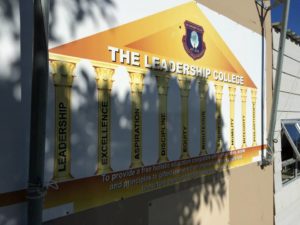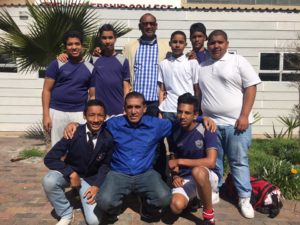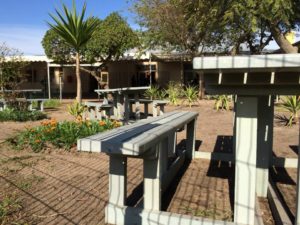The Leadership College
The Reverse Generational Contract as a financial model requires a vast amount of data in order for the calculations to be fair and financially sustainable. The feasibility study, in South Africa and Rwanda, will include three very important aspects; the needs and skills gap in terms of employment opportunities in the labour market, the structures and barriers to entry of higher education systems and mostly importantly to prove that framework conditions for the RGC are in place. A sustainable, financially sound business model is the key factor of success for the RGC. We are building a network of key partners who will assist during our study and would like to introduce you to one of our partners, with whom we are very excited to be working with.
There is a place, on the outskirts of Cape Town, far away from the wealthy suburbs, where a community of over 300 000 people live. Everyone who has ever travelled to the city will know this flat, vast area with rows upon rows of fragile tin structures, tiny wooden houses, or simple government housing as the Cape Flats. It is a strong contrast to the mansions built beneath Table Mountain, a clear indicator of the extreme inequality in Cape Town.
 Manenburg, an area in the Cape Flats, is notoriously known for its gang-violence. Growing up here, children are exposed to violence, drugs and gangs. Many of them come from child-led households and have very fragile support structures. However, there is one support structure within this community that has become a beacon of hope. The Leadership College, or TLC as it is fondly referred to, offers children in Manenberg high-quality education and a nurturing environment. Ashra Norton, the schools Founders says, “When the department closed the schools in the area because of gang violence, it was school as usual for us, with nearly a full attendance list. I strongly believe that children are safer inside the school grounds than at home.”
Manenburg, an area in the Cape Flats, is notoriously known for its gang-violence. Growing up here, children are exposed to violence, drugs and gangs. Many of them come from child-led households and have very fragile support structures. However, there is one support structure within this community that has become a beacon of hope. The Leadership College, or TLC as it is fondly referred to, offers children in Manenberg high-quality education and a nurturing environment. Ashra Norton, the schools Founders says, “When the department closed the schools in the area because of gang violence, it was school as usual for us, with nearly a full attendance list. I strongly believe that children are safer inside the school grounds than at home.”
For most of us, attending university or even high school is not something we question. We have access to lights and a desk where we can do our homework, hot water to have a shower before the school day starts and enough food to pack a lunch. This is not the same for all young students in Manenberg, but The Leadership College is changing this. Here every single, student’s needs are taken seriously.
The building structures of The Leadership College are modest. But that it is not important, it is what happens inside these buildings that make it so unique. Mr. Atcha, the principle, stands at the school gate and greets all 650 high school students by name every morning. He knows each pupil. He quickly recognises if they have something troubling them. The door to his office is always open and many hours are spent assisting students with problems they may be having outside of at school or at home.
All the teachers work hard; nurturing these young leaders, shaping them into young people that strive for excellence, move forward with ambition and give back to their community. The quality of the education they offer is evident in the annual results of the final exams, where 92% of learners passed their Matric. Once scholars have left school they continue to be a part of the TLC community, the few that have the opportunity to attend University come back and give workshops or donate time and resources to the community. It is an example of a solidarity community, one that speaks to the core values of the RGC.
The RGC project team is very inspired by the work this school does. Over the last 5 years they have expanded and now have 5 schools in the area. We are honoured to say that The Leadership College has agreed to partner with us for our research. With them, we will be able to establish what exactly the barriers are to tertiary education and how best to adapt our model to enable more students to attend University. We will also learn what it means to build a community that stands together, in solidarity for the future of young people in South Africa.
We look forward to the research with a partner that will help us to truly understand the context in which we wish to work in the future.


What is the „RGC in low and middle income countries“ project?
L’appel Deutschland and CHANCEN eG have partnered to expand the Reverse Generational Contract into Africa. The Reverse Generational Contract (RGC) is a financial model that offers fair financing to students. By means of impact investments, students’ fees are covered by a fund which is managed by a cooperative. Once students have graduated, they make relative, income-based repayments. The repayments are a set percentage of the beneficiary’s salary, as stated in the binding contract between the parties involved. The model ensures everyone has equal opportunities, irrespective of their financial background. CHANCEN has vast experience in sustainable financing of education, the best partner in this area. L’appel is an NGO with field experience in implementing RGC like models in Sierra Leone. Both are born from the University of Witten/Herdecke, we share similar values and carry the same vision.

